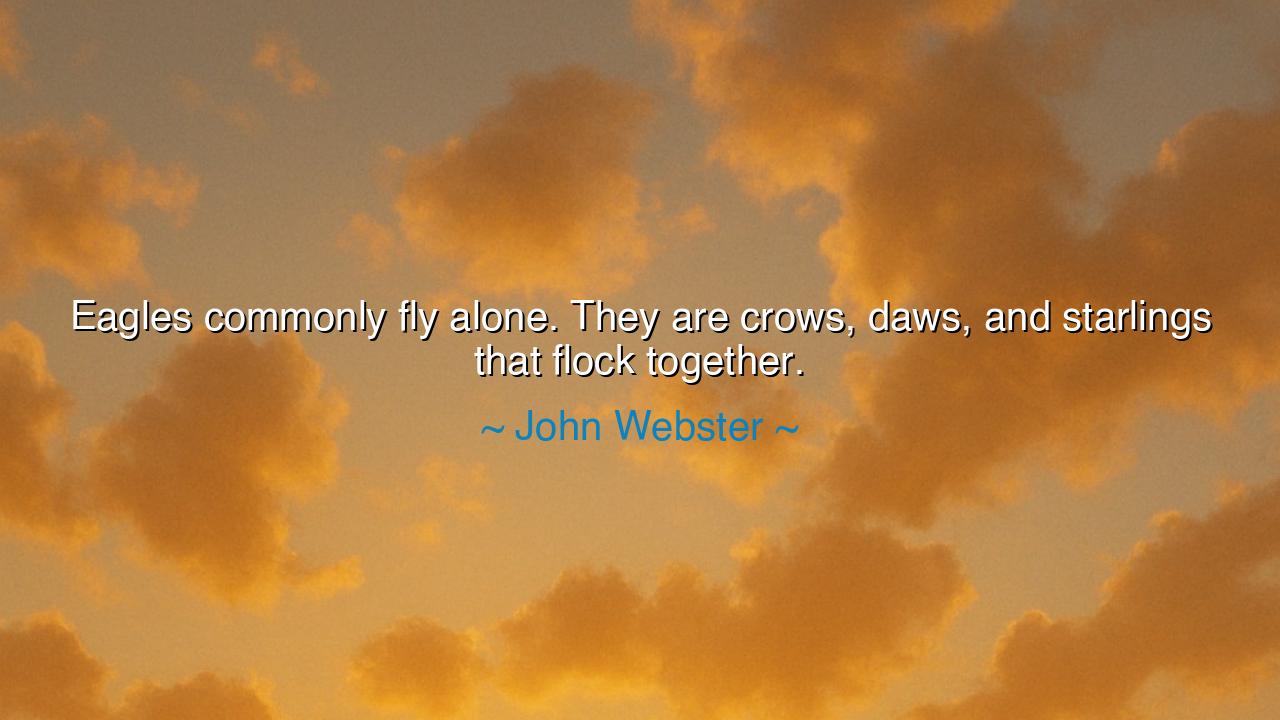
Eagles commonly fly alone. They are crows, daws, and starlings






“Eagles commonly fly alone. They are crows, daws, and starlings that flock together.” — thus wrote John Webster, the Elizabethan dramatist whose words, though born in the early seventeenth century, still soar across the centuries like the eagle of which he spoke. This quote, brief yet thunderous in its meaning, is a meditation on greatness, individuality, and solitude. Webster reminds us that the path of the extraordinary is a lonely one. The eagle, noble and fierce, does not follow the murmuring crowds; it rises above them, alone in the vastness of the sky. In contrast, the lesser birds — the crows and starlings — seek comfort in numbers, huddling together in safety and noise. So it is with men and women: the common spirit follows the flock, but the soul destined for greatness must learn to dwell in solitude and height.
Webster lived during an age of drama and storm — a time when poets like Shakespeare and Marlowe revealed the heights and abysses of the human soul. His own works, such as The Duchess of Malfi, burned with themes of power, corruption, and courage, and from this fiery vision his aphorism seems to have been born. In his words, we hear not scorn for the many, but reverence for the few who dare to stand apart. The eagle, for him, was not simply a bird of prey, but a symbol of spiritual nobility, of vision that reaches beyond the ordinary horizon. To fly alone is to accept the price of greatness: isolation, endurance, and the burden of one’s own conscience.
There is a solemn majesty in this truth. The crowd is comforting — it shields us from fear, from doubt, from the cold wind of independence. But the crowd also smothers individuality; it teaches conformity where courage is required, and mediocrity where excellence is possible. The eagle does not fear the storm, for it is the storm that lifts it higher. So too, the one who would achieve greatness must be willing to walk alone, misunderstood, perhaps even despised, yet steadfast in the pursuit of what is right and true. To rise above the ordinary, one must be willing to leave the ordinary behind.
Consider Socrates, the ancient philosopher of Athens. Surrounded by his fellow citizens, he refused to conform to their false wisdom. While others sought comfort in approval, he sought truth. His refusal to follow the flock led him to stand alone before the court, accused and condemned — yet in that solitude, he became immortal. Like the eagle, he soared where others dared not. His name endures, while the multitude who mocked him are long forgotten. Socrates’ life is the living embodiment of Webster’s wisdom: that those who see farther must often stand apart.
The eagle’s solitude is not loneliness, but freedom. Alone in the open sky, it sees what no flock can see. It chooses its course by its own will, not by the shifting movements of others. So too, the great soul finds its fulfillment not in the approval of the many, but in the harmony between its own actions and its inner truth. The man or woman who learns to love such solitude becomes unshakable — their worth is not measured by praise, nor their course altered by criticism. To stand alone is not arrogance; it is courage — the courage to be guided by one’s vision when the world prefers blindness.
Yet Webster’s words carry not only pride but warning. To fly alone requires strength of spirit, lest solitude turn to despair. The eagle must have both wings and purpose, for height without direction is only exile. Likewise, those who choose independence must temper their pride with humility, remembering that to lead is to serve a higher ideal — not to escape humanity, but to elevate it. The eagle’s solitude is noble because it seeks light; the crow’s gathering is ignoble when it seeks only noise. True greatness does not isolate itself from compassion, but from corruption; it flies alone not out of disdain, but out of dedication.
Lesson: Do not fear solitude; fear the loss of yourself in the clamor of the crowd. Seek moments of stillness where you can hear your own soul speak. Be willing to fly alone when truth demands it, and do not envy those who flock together in ease. Greatness is a lonely summit, but from that height, you will see what others cannot — the wide horizon of purpose, the endless sky of possibility. Train your spirit as the eagle trains its wings, to rise higher when storms appear. For those who learn to love the wind and the height will never again be bound by the noise below.
Thus, John Webster’s words endure like a mountain wind — cold, pure, and awakening. He teaches us that the price of greatness is solitude, but that in this solitude lies the truest form of freedom. The eagles of the world may be few, but it is their flight that defines the sky.






AAdministratorAdministrator
Welcome, honored guests. Please leave a comment, we will respond soon